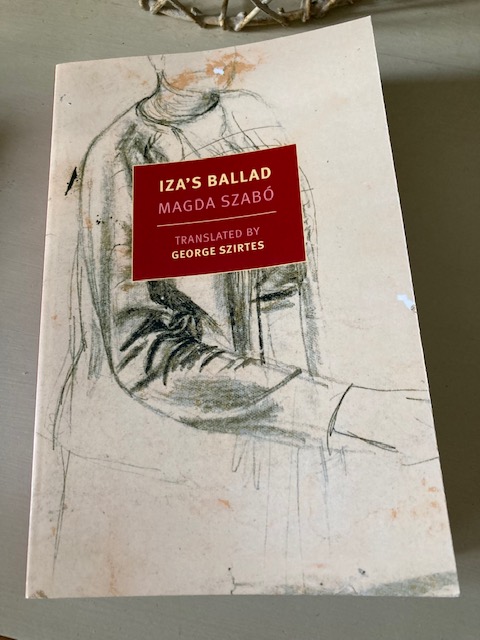A year ago, I read Iza’s Ballad, an excellent novel by the critically-acclaimed Hungarian writer Magda Szabó. First published in Hungary in 1963, Ballad explores the frustrations and heartbreak between a mother and her daughter, two very different women with contrasting ideals. Among other things, the story exposes the damage we inflict on those closest to us, sometimes unintentionally. It’s a theme that also feels relevant to Katalin Street, another poignant story of complex family relationships, although in this instance much of the trauma stems from war.
This novel, which came later in 1969, focuses on three middle-class Hungarian families living in adjacent houses in Budapest’s Katalin Street: Mr and Mrs Elekes and their two daughters, the dutiful, clever Irén, and the younger, wilder Blanka; Major Biró, his housekeeper, Mrs Temes, and his son, Bálint; and finally, the Jewish dentist Mr Held, his wife Mrs Held, and their amiable daughter, Henriette.
Szabó has given her novel a very interesting structure, showing us key moments in the families’ lives from the mid-1930s to the late-1960s, opening with an initial section on where these characters have ended up. Here we find the Elekes crammed into a flat in a soulless apartment block on the Danube’s left bank, directly opposite their old home in Katalin Street, which they can see across the river.
As the story unfolds, we begin to see how their lives have been impacted over the years. Former headmaster, Mr Elekes – a man of strong moral standing – is losing his sight; moreover, political forces across Europe and events closer to home have undermined his previously solid beliefs in decency and integrity. Mrs Elekes too seems a shadow of her former self, yearning for her old furniture and possessions, many of which were shed during the move from Katalin Street. Her youngest daughter, Blanka, is another painful loss, currently living in Greece in exile from her family, the reasons for her banishment are merely hinted at initially but ultimately become clear in the second part of the book.
No work of literature, and no doctor, had prepared the former residents of Katalin Street for the fierce light that old age would bring to bear on the shadowy, barely sensed corridor down which they had walked in the earlier decades of their lives, or the way it would rearrange their memories and their fears, overturning their earlier moral judgements and system of values. […] no one had told them that the most frightening thing of all about the loss of youth is not what is taken away but what is granted in exchange. Not wisdom. Not serenity. Not sound judgement or tranquillity. Only the awareness of universal disintegration. (pp. 1-2)
The Elekes’ eldest daughter, Irén, still lives with her parents. Now a successful teacher herself, Irén has a young daughter, Kinga, but her emotional life is complex with ties to two men – Kinga’s father, a dependable engineer named Pali, and her childhood sweetheart, Bálint, who also seems to be living in the Elekes’ flat. Hovering over all of this is the ghostly presence of Henriette, the Helds’ gentle daughter who died during the war. Several chapters in the narrative show us events from Henriette’s perspective, adding another layer to an already intricate structure.
Following this opening section, which is entitled ‘Places’, Szabó moves back in time, showing us events at six milestones from 1934 to 1968, with a significant chunk devoted to 1944, a pivotal period in the families’ histories. The focus is on the younger generation of each of the three families – more specifically, Irén and Blanka, who as young girls play with Bálint Biró (the oldest of the four children) and Henriette Held (the youngest).
Over the course of these thirty-four years, there are childhood games and celebrations – but there are also deaths and deportations, lies and betrayals, imprisonments and banishments, much of the trauma stemming from the consequences of war. By tracing the dynamics affecting these families, Szabó weaves a compelling combination of the personal and the political, encompassing the interwar years, WW2 and the rise of Communism under the Soviets in the post-war years. Those who have survived the war are struggling in a strange state of unreality, indelibly altered by the ravages of the past. The gap between the lives these individuals once imagined for themselves and the cards fate has dealt them is devastating – too deep and ruinous to be bridged.
My [Irén’s] thoughts often went back to that moment, just as they did to the sight of Mrs. Temes coming into the bedroom carrying a tray, a strong, laughing, ever-cheerful, and reassuring figure. The Mrs. Temes I know today is very different—tearful and timid, her face empty, watchful, or lit up with greed. I didn’t know then that some people die long before their real death. Nor did I imagine that the last time you saw them might also be the last time they were truly alive. (p. 87)
As in Iza’s Ballad, the characterisation is excellent; all the key figures feel fully fleshed-out, painted in nuanced shades of grey, each with their own beliefs, values, flaws and complexities – their own forms of inner turmoil. Despite her orderly, sensible nature, Irén is prone to jealousy, a trait that taints her relationship with Bálint, just at the time when they ought to be at their happiest. Blanka, on the other hand, has a malicious streak, fabricating lies that prove damaging to Bálint’s medical career at the city’s hospital. Even Bálint has his faults, lapsing into self-loathing, weighed down by the burden of guilt – the circumstances of Henriette’s death proving pivotal here.
In summary, then, Katalin Street is a complex, layered book, an absorbing combination of the personal and the political, highlighting how the destruction of war can tear families apart. It’s a more challenging read than Iza’s Ballad, but ultimately very rewarding for patient readers.
Katalin Street is published by NYRB Classics; personal copy.





